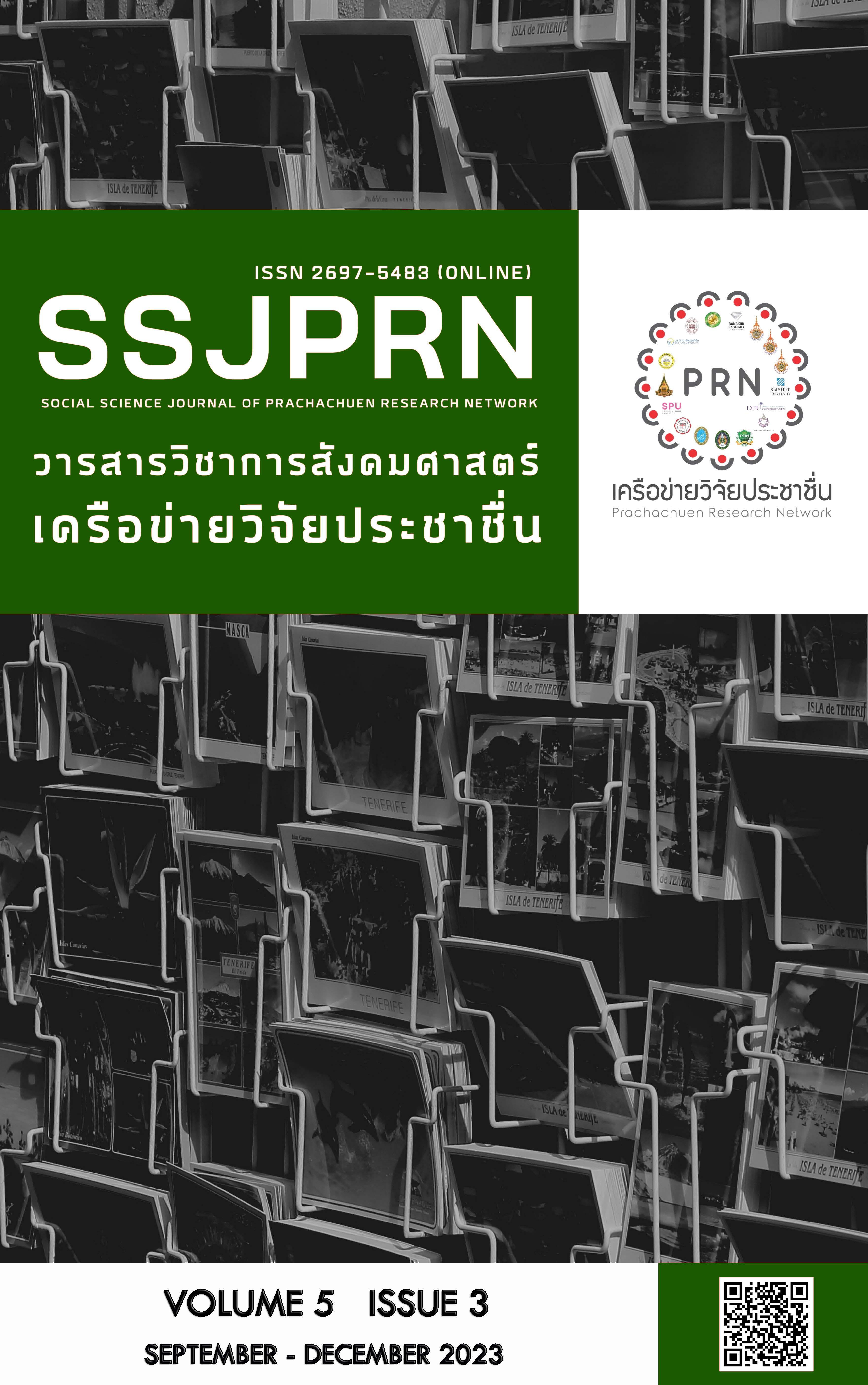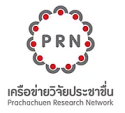DEVELOPMENT OF THE ACCOUNTING INFORMATION SYSTEM OF THE LIFE INSURANCE WASTE SEPARATION BANK, MORAL COMMUNITY, KHON NON MAHASAWAT TEMPLE. NONTHABURI PROVINCE
Keywords:
Accounting Information System, The Waste Separation Bank, Life InsuranceAbstract
This research has developed the accounting information system of the Waste Separation Bank, Life Insurance of Moral Community in Konon Mahasawat Nonthaburi, which can help the project committee to manage information about the members and wastes, make a list of the project's purchases and sales of wastes, and view reports of the project's income and expenses accurately. Begin by examining the operational process using the original working documents and interviewing the project committee. The requirements for the new system and the Software Requirements Specification (SRS) were determined and the new system was analyzed and designed with context diagrams, Data Flow Diagrams (DFD), and the database was designed with Entity Relationship Models. Thereafter, the analyzed and designed information was developed into the accounting information system of the life insurance waste separation bank and developed using MS Access. The capability test was conducted by experts who found that the system is capable of fully meeting the requirements of SRS. The satisfaction was also evaluated by three committees found that the overall satisfaction is 4.56, which has the practical issues that have the least evaluation results due to the design of the screen that has too many menus and information combined on the same page, as a result, the user is difficult to operate. Password authentication cannot be changed. Therefore, the system screen should be designed to facilitate the understanding of operation and include a function to change and set the password to increase the standard.
References
กฤตย์ ใจน้อย. (2562). ออกแบบ UI (User Interface) ให้ใช้งานง่ายด้วย 10 Usability Heuristics. https://medium.com/upskill-ux/ออกแบบ-ui-ให้ใช้งานง่าย-ด้วย-10-usability-heuristics-upskill-ux-41d50c525f32
ณัฐที ปิ่นทอง. (2560). การพัฒนาระบบบริหารจัดการธนาคารขยะออนไลน์ของมหาวิทยาลัยราชภัฏราชนครินทร์. วารสารมนุษยศาสตร์และสังคมศาสตร์ มหาวิทยาลัยมหาสารคาม, 36(6), 113-124.
นัฐพงศ์ ส่งเนียม.(2563). การพัฒนาระบบสารสนเทศเพื่อการจัดการขยะสำหรับศูนย์เรียนรู้ การจัดการขยะแบบครบวงจร. วารสารวิจัยมหาวิทยาลัยเทคโนโลยีราชมงคลศรีวิชัย, 12(3), 506-521.
ปราศิยฉัตร บุญจวง. (2562). กองทุนธนาคารขยะเพื่อชีวิตกับการให้สวัสดิการชุมชนกรณีศึกษา : หมู่บ้านบะแค ที่ได้รับรางวัลซีโร่เวส (Zero Waste) อันดับที่ 1 ในเขตเทศบาลตำบลแวงใหญ่ อำเภอแวงใหญ่ จังหวัดขอนแก่น. วารสารการบริหารนิติบุคคลและนวัตกรรมท้องถิ่น, 6(2), 129-147.
ปิยะรักษ์ ประดับเพชรรัตน์, สุชาติ นวกวงษ์, สยาม อรุณศรีมรกต และ ไกรชาติ ตันตระการอาภา. (2553). ศักยภาพในการลดปริมาณขยะชุมชน จากโครงการธนาคารขยะรีไซเคิล. วารสารการจัดการสิ่งแวดล้อม, 6(2), 54-66.
พรรณเพ็ญ สิทธิพัฒนา. (2562). ปัจจัยเชิงสาเหตุที่ส่งผลต่อคุณภาพของรายงานทางการเงินและประสิทธิภาพการตัดสินใจของบริษัทจดทะเบียนในตลาดหลักทรัพย์ทางเลือกเพื่อการลงทุน (เอ็ม เอ ไอ). วารสารมนุษยศาสตร์และสังคมศาสตร์ มหาวิทยาลัยราชพฤกษ์, 4(3), 59-74.
พัชราภรณ์ หงส์สิบสอง, ภัทธีรา ธุระยศ และ พสิษฐ์ กันละนนท์. (2564). การพัฒนาเว็บแอปพลิเคชันเพื่อการจัดการข้อมูลธนาคารขยะ โดยการมีส่วนร่วมของชุมชนมหาโพธิ์ อำเภอเมือง จังหวัดน่าน.วารสารวิชาการการจัดการเทคโนโลยี มหาวิทยาลัยราชภัฏมหาสารคาม, 8(1), 73-86.
พิมลพรรณ ลีลาภัทรพันธุ์, อับดุลเลาะ บากา, ซันวานี จิใจ, แพรวศรี เดิมราช และสุลัยมาน เภอโส๊ะ. (2566). ระบบบริหารจัดการขยะออนไลน์. https://profile.yru.ac.th/storage/journals/ae7300caf5a9c797bd53c412f1862bc9.pdf
ไพลิน ตรงเมธีรัตน์. (2561). ระบบสารสนเทศทางการบัญชี หลักการเบื้องต้นและกระบวนการธุรกิจ (พิมพ์ครั้งที่ 1). สำนักพิมพ์มหาวิทยาลัยธรรมศาสตร์.
มริษา สุดอุดม และภัทรา สวนโสกเชือก,(2566).ศึกษาเรื่องการพัฒนาแอปพลิเคชันธนาคารขยะเพื่อจัดการขยะชุมชน. PBRU Science Journal, 20(1), 34-47.
ศรีนวล ฟองมณี. (2557). การวิเคราะห์และออกแบบระบบ. เชียงราย: สำนักวิชาการคอมพิวเตอร์และเทคโนโลยีสารสนเทศ, มหาวิทยาลัยราชภัฏเชียงราย.
สภาวิชาชีพบัญชี. (2562). ประกาศสภาวิชาชีพบัญชี ที่ 34/2562 เรื่องมาตรฐานการบัญชี ฉบับที่ 2 เรื่อง สินค้าคงเหลือ. https://www.tfac.or.th/upload/9414/ejsqUfCjZT.pdf
อภิญญา ดวงภักดี. (2560). ปัจจัยที่มีอิทธิพลต่อประสิทธิภาพการใช้ระบบสารสนเทศทางการบัญชีเพื่อการวางแผนทรัพยากร : กรณีศึกษาบริษัทผลิตไม้ยางพาราแปรรูปในประเทศไทย. [วิทยานิพนธ์ปริญญามหาบัณฑิต ไม่ได้ตีพิมพ์] มหาวิทยาลัยสงขลานครินทร์.
ACIS Professional Center. (2566). แนวคิดการระบุตัวตน การพิสูจน์ตัวตน และการให้สิทธิ์. https://www.acisonline.net/?p=9723
Isaias, P. & Issa, T. (2015). High level models and methodologies for information systems. Springer.
Nielsen, J. (2020). 10 Usability Heuristics for User Interface Design. https://www.nngroup.com/articles/ten-usability-heuristics/
Krishna, S. T., & Sreekanth, S. (2016). Confident Software Development Process Model. International Journal of Pharmacy & Technology, 8(3), 15939-15948.
Moores, K., & Yuen, S. (2001). Management accounting systems and organizational configuration: a life-cycle perspective. Accounting, Organizations and Society, 26(4), 351-389.
Phomlaphatrachakom, K. (2020). Accounting control system, accounting information quality, value creation and firm success: an empirical investigation of auto parts businesses in Thailand. International Journal of Business, 25(2), 159-177.
Radack, S. (2009). The System Development Life Cycle (SDLC), ITL Bulletin, National Institute of Standards and Technology, Gaithersburg, MD. https://tsapps.nist.gov/publication/get_pdf.cfm?pub_id=902622
Yodrach, W. (2015). Effectiveness of an Accounting Information System Affecting the Performance of Listed Companies in The Stock Exchange Thailand. Research Methodology & Cognitive Science, 12(2), 58-69.
Downloads
Published
How to Cite
Issue
Section
License
Copyright (c) 2023 Social Science Journal of Prachachuen Research Network

This work is licensed under a Creative Commons Attribution-NonCommercial-NoDerivatives 4.0 International License.
บทความที่ได้รับการตีพิมพ์เป็นลิขสิทธิ์ของวารสารวิชาการสังคมศาสตร์เครือข่ายวิจัยประชาชื่น







